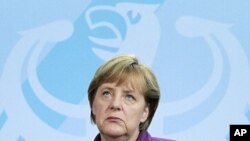German Chancellor Angela Merkel says the 17-nation bloc that uses the euro currency must do everything it can to avoid an "uncontrolled insolvency" by Greece.
The German leader said Tuesday that the effects would be far-reaching if Athens defaults on payments for its international bailout loans. She said the danger is "very big" that with a Greek default, other eurozone countries "would quickly face a domino effect."
While Greece has struggled to implement its plan to trim deficit spending in the face of a growing recession, Italy and Spain are also seeking to cut their debts to avoid the need for bailouts.
Italy said its finance minister, Giulio Tremonti, met last week with Chinese officials about the possibility of China buying Italian government bonds, a move aimed at cutting Rome's rising borrowing costs. On Tuesday, there was limited demand at an auction for nearly $9 billion worth of Italian bonds, and the government was forced to pay a higher interest rate than at a similar sale two months ago.
Merkel's comments seemed to rebuke her economy minister, Philipp Roesler, who said in a newspaper column Monday that the eurozone could no longer dismiss the possibility of an "orderly default" by Greece. The German chancellor said that everyone "should very carefully weigh their words" to avoid further turmoil in world financial markets worried about a Greek default.
She said that "if the euro fails, Europe fails."
U.S. President Barack Obama, in an interview with Spanish journalists, said the big European countries and the continent's leaders have to better coordinate their fiscal affairs. He said eurozone leaders must take responsibility for the debt crisis.
The Greek government's austerity efforts have proved unpopular at home, even as European leaders urge Athens to implement them as quickly as possible. Workers in a variety of trades and professions have staged work stoppages in protest, and homeowners are upset that the government announced a new property tax over the weekend, on top of a higher sales tax on restaurants just 10 days earlier.
Prime Minister George Papandreou has been trying to lobby Parliament to approve the new measures. He says that "Together we must silence those who doubt us."
French President Nicolas Sarkozy and Merkel are planning to discuss the debt crisis with Papandreou in a telephone conference on Wednesday.
Some information for this report was provided by AP, AFP and Reuters.




